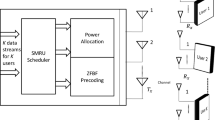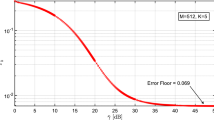Abstract
Multiple-input multiple-output (MIMO) wireless communication systems in combination with orthogonal frequency division multiple access and space division multiple access are flexible, spectrally efficient and of high capacity. These systems can allocate frequency, time, and space resources adaptively among mobile stations. Optimal resource allocation (RA) for maximizing the sum rate is usually too complex for practical applications, hence suboptimal algorithms are required. The performance of RA algorithms are degraded due to imperfections in channel state information at transmitter (CSIT). Thus, techniques that make the RA algorithm, robust against CSIT errors are favorable. In this paper, two novel suboptimal grouping algorithms are introduced that are shown to achieve better sum rate-complexity and fairness-complexity performances. A novel index is proposed to measure the efficiency of RA algorithms, which takes into account sum rate and complexity simultaneously. Moreover, the effect of erroneous CSIT on sum rate is investigated and it is shown that performance of the proposed RA algorithms with erroneous CSIT are superior to the existing schemes. Finally, fairness performance of the proposed RA algorithms are evaluated, which are shown to be the same if not superior to other existing algorithms.










Similar content being viewed by others
References
Maciel, T. F., & Klein, A. (2010). On the performance, complexity, and fairness of suboptimal resource allocation for multiuser MIMO-OFDMA systems. IEEE Transactions on Vehicular Technology, 59(1), 406–419.
Telatar, E. (1999). Capacity of multi-antenna gaussian channels. European Transactions on Telecommunications, 10(6), 585–595.
McKay, M. R., Smith, P. J., Suraweera, H. A., & Collings, I. B. (2008). On the mutual information distribution of OFDM-based spatial multiplexing: Exact variance and outage approximation. IEEE Transactions on Information Theory, 54(7), 3260–3278.
Letaief, K. B., & Zhang, Y. J. (2006). Dynamic multiuser resource allocation and adaptation for wireless systems. IEEE Wireless Communications, 13(4), 38–47.
Spencer, Q. H., & Swindlehurst, A. L. (2004). Channel allocation in multi-user MIMO wireless communications systems. In Proceedings IEEE international conference on communications (ICC) (Vol. 5).
Maciel, T. F., & Klein, A. (2007). A resource allocation strategy for SDMA/OFDMA systems. In Proceedings 16th IST mobile and wireless communications summit (pp. 1–5).
Vishwanath, S., Jindal, N., & Goldsmith, A. (2003). Duality, achievable rates, and sum-rate capacity of Gaussian MIMO broadcast channels. IEEE Transactions on Information Theory, 49(10), 2658–2668.
Tejera, P., Utschick, W., Bauch, G., & Nossek, J. A. (2006). Subchannel allocation in multiuser multiple-input-multiple-output systems. IEEE Transactions on Information Theory, 52(10), 4721–4733.
Tsang, Y. M., & Cheng, R. S. (2004). Rate maximization in space-division multiple access (SDMA)/multi-input-single-output (MISO)/OFDM systems under QoS and power constraints. In Proceedings IEEE international conference on communications (ICC) (Vol. 5, pp. 2970–2974).
Dianati, M., Shen, X., & Naik, S. (2005). A new fairness index for radio resource allocation in wireless networks. In Proceedings IEEE wireless communications and networking conference (Vol. 2, pp. 712–717).
Yoo, T., & Goldsmith, A. (2006). Capacity and power allocation for fading MIMO channels with channel estimation error. IEEE Transactions on Information Theory, 52(5), 2203–2214.
Kuhne, A., & Klein, A. (2007). Adaptive subcarrier allocation with imperfect channel knowledge versus diversity techniques in a multi-user OFDM-system. In Proceedings IEEE 18th international symposium on personal, indoor and mobile radio communications, (PIMRC) (pp. 1–5).
Kaltenberger, F., Kountouris, M., Cardoso, L., Knopp, R., & Gesbert, D. (2008). Capacity of linear multi-user MIMO precoding schemes with measured channel data. In Proceedings IEEE 9th workshop on signal processing advances in wireless communications (SPAWC) (pp. 580–584).
Peel, C. B., Hochwald, B. M., & Swindlehurst, A. L. (2005). A vector-perturbation technique for near-capacity multiantenna multiuser communication-part I: Channel inversion and regularization. IEEE Transactions on Communications, 53(1), 195–202.
Fuchs, M., Del Galdo, G., & Haardt, M. (2007). Low-complexity space time frequency scheduling for MIMO systems with SDMA. IEEE Transactions on Vehicular Technology, 56(5), 2775–2784.
Dimic, G., & Sidiropoulos, N. D. (2005). On downlink beamforming with greedy user selection: Performance analysis and a simple new algorithm. IEEE Transactions on Signal Processing, 53(10), 3857–3868.
Yoo, T., & Goldsmith, A. (2005). Optimality of zero-forcing beamforming with multiuser diversity. In Proceedings IEEE international conference on communications (ICC) (Vol. 1, pp. 542–546).
Shad, F., Todd, T. D., Kezys, V., & Litva, J. (2001). Dynamic slot allocation (DSA) in indoor SDMA/TDMA using a smart antenna base station. IEEE/ACM Transactions on Networking, 9(1), 69–81.
Jindal, N., Rhee, W., Vishwanath, S., Jafar, S. A., & Goldsmith, A. (2005). Sum power iterative water-filling for multi-antenna Gaussian broadcast channels. IEEE Transactions on Information Theory, 51(4), 1570–1580.
Jain, R., Chiu, D. M., & Hawe, W. R. (1984). A quantitative measure of fairness and discrimination for resource allocation in shared computer system. Eastern Research Laboratory, Digital Equipment Corporation, DEC-TR-301.
Author information
Authors and Affiliations
Corresponding author
Rights and permissions
About this article
Cite this article
Majidzadeh, M., Eslami, M. Efficient Suboptimal Resource Allocation Algorithms for Multiuser MIMO-OFDMA Systems. Wireless Pers Commun 82, 1967–1985 (2015). https://doi.org/10.1007/s11277-015-2325-2
Published:
Issue Date:
DOI: https://doi.org/10.1007/s11277-015-2325-2




